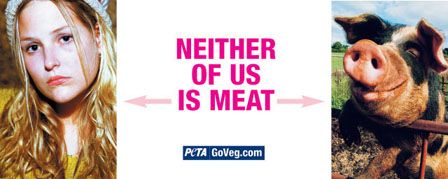STORY about Gender posted on March 25, 2012 by Eli Mills
PETA's Campaign Glamorizes Violence Against Women, Say Local Activists
TRIGGER WARNING: link to PETA's "boyfriend went vegan" video http://www.peta.org/tv/videos/psas-vegetarianism/1190924841001.aspx
Also posted by Eli Mills:
Also in Gender:
A woman is walking through an alley looking dazed and dishevelled. She is wearing nothing but a jacket and a neck brace, suggesting a serious and recent injury. The shaky camera shows glimpses of her panties as she falls up the stairs barely able to stand. The PSA cuts to flashback imagery of rough sex with a man where the woman’s head (only somewhat suggestively) goes through a wall. Then cuts back to the woman tossing a bag of groceries at her boyfriend, who is jovially repairing a hole in the wall near what appears to be the couples’ bed. What is this advertisement about, you may ask? Violence against women? Sexual assault within relationships? Date rape? One would hope that the goal or reasoning behind subjecting people to such triggering imagery would be clear, right?
Nope. This masterpiece of a public service announcement is actually about the benefits of veganism. After watching it a second time, one can see they are trying to suggest that going vegan will increase the male libido, making you (or your man) able to “bring it like a tantric porn star.”
“To me it’s basically glorifying rape,” says Robin Anderson, a vegan and animal rights activist. “It’s disgusting. It’s perpetuating the oppression of women in our society.”
The ad is just another gem from PETA (People For The Ethical Treatment of Animals). PETA is perhaps the most well-known and pervasive animal rights organization in North America with over 3 million members and supporters worldwide. They are well known for controversial, attention grabbing campaigns and tactics at demos. From scantily clad celebs to holocaust references to images of women being clubbed to death while wearing fur coats, PETA is perhaps more well known for pissing people off and offending minority groups than, well, you know...animal rights education or activism.
“I’d rather go naked than wear fur” is one of their most well-known campaigns. The campaign features nude photos of celebrities such as Kim Basinger and Pamela Anderson all preaching the evils of the fur industry by bearing their naked flesh. And doing nothing but posing passively. It is worth noting that all the models for these ads are thin, apparently white, able bodied, cisgendered, and adhere to pretty much every societal standard of beauty in existence. It is also worth noting that the vast majority of these print ads contain very little text beyond a catchy headline, therefore relaying very little information about the evils of fur or the animals being killed for the industry.
Another appalling example of the ways in which PETA attempts to provoke thought is a 2003 billboard campaign in which pig farming is compared with Robert Pickton’s murders of sex workers. “It should go without saying that no one—whether they have two legs or four—deserves to be tortured, killed, cut up, and eaten, and that's why PETA ran this billboard in Edmonton after the murders,” reads the website.
PETA freely admits that much of what they do is attempt to get media attention, or as they put it: “free advertising.” “It is sometimes necessary to shake people up in order to initiate discussion, debate, questioning of the status quo, and, of course, action,” reads the website. The question is whether or not it is worth perpetuating violence against women in order to raise awareness about cruelty to animals. It’s also worth questioning if this tactic is even useful. Are folks talking about health benefits of veganism, alternatives to leather, or the environmental impacts of farmed salmon? Or are they posting these ads on their facebook wall because they are so miffed about what they are seeing?
“They seem to appeal to people at the lowest base level in a lot of ways,” says Anderson of their direct action tactics and PSA’s.
“They don’t have a broad enough analysis of animal rights and the ways in which animal rights are inherently connected to women’s rights and other struggles for equality.”
PETA’s Associate Director of Campaigns and Outreach, Lindsay Rajt, insists that PETA has a little something for everyone and that if someone is offended by one ad campaign, they could very well peruse PETA.org and find something they like. “We even have a campaign directed towards senior citizens senior citizens,” she says. “We try to reach every segment of the population. That’s why we use tactics from conservative to bold. If one campaign doesn’t resonate with someone I would encourage them to explore the rest of PETA.org”.
In regards to their “boyfriend went vegan” campaign, Rajt insists that the ad is in good humour. “I think people can see at the end of the ad that she’s smiling because she has enjoyed rigorous sex,” she says. “She’s carrying a bag of vegetables for him because she had so much fun and is ready to go back to work.”
“It’s not OK to suggest that such a level of harm would lead anybody to smile,” says Sue who has been involved with animal rights and feminist activism for quite some time. “It normalises violence against women. There is nothing normal about a woman walking down the street in a neck brace and underwear. Nor is it normal for her to go home to her boyfriend who perpetrated said violence.”
When questioned about the part where the woman’s head goes through the wall and whether or not the ad perpetuates violence against women, Rajt said: “it’s really just an ad about safe sex due to the passion that a vegan diet evokes.”
“If that’s what she actually thinks, she hasn’t seen the ad,” insists Anderson.
Numerous animal rights activists are finding it more and more difficult to be politically allied with PETA. “I actually would discourage anyone from forming any alliance with PETA,” says Sue. Their reputation is such that supporting them could very well mean losing support from other members of the community and it’s just not worth it.
PETA held a demo in Vancouver last Sunday protesting airlines who continue to transport primates destined for laboratories. “I wanted to be there for the action because it’s a really important cause,” says Anderson. It’s important to consider who was absent simply because it was organized by PETA. “Some people said that they had friends who declined because it was organised by them and they did not want to be associated with PETA,” said Anderson. Sue, Robin and some other concerned members of the animal rights community handed out some pamphlets listing various grievances with PETA’s tactics and campaigns. The zines were mostly well received, with the exception of a few attendees.
Still, some may not want to distance themselves from PETA due to their star power and ability to attract the masses. “In a way I was glad that PETA was there because with PETA comes a ton of media,” says Anderson of last Sunday’s demo.
When Rajt was told that some folks actually decided not to come to this demo because PETA was one of the key organizers, she said “within every movement there are differences of opinion regarding tactics.”
But is it too hard to simply change these tactics that are so obviously offensive? “I really do think it’s possible for PETA to get their message across in ways that aren’t super oppressive,” says Anderson.
Sue says she needs to see nothing short of a radical shift in PETA’s analysis of anti-oppression work and the ways in which they get their message across to the public. “Oppressions are interlocking. We can’t look at one form of oppression and disconnect it from other forms.”
If you would like to let PETA know what you think of their new “boyfriend went vegan” campaign, please email Lindsayr@peta.org
The site for the Vancouver local of The Media Co-op has been archived and will no longer be updated. Please visit the main Media Co-op website to learn more about the organization.


Comments
Great story!
Great story!